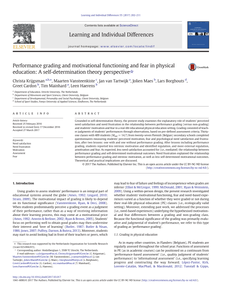Students’ knowledge about the criteria for an upcoming test is a crucial component of assessment quality. Grounded in self-determination theory, we investigated whether knowledge about the criteria for an upcoming test related to students’ situational motivation and experienced anxiety during physical education (PE). We also examined whether these relations were: (a) mediated by need-based experiences; and (b) moderated by teachers’ motivating style. Participants were 659 students (55.54% boys, 44.46% girls, mean age 14.72 years, standard deviation = 0.94) out of 40 classes from 32 schools taught by 39 different PE teachers. Analyses through multilevel structural equation modeling showed that students with more knowledge about the criteria for an upcoming test valued and enjoyed the lesson more (i.e. autonomous motivation), and felt less aloof (i.e. amotivation). Relations between knowledge about the criteria and students’ situational motivation were mediated by experienced need satisfaction. Specifically, students who had more knowledge about the criteria for an upcoming test felt more in charge of their learning process (i.e. autonomy satisfaction), felt more effective in reaching their goals (i.e. competence satisfaction) and felt more connected to the teacher (i.e. relatedness satisfaction). Although relations between knowledge about the criteria and students’ motivation were not moderated by teachers’ motivating style, teachers’ motivating style displayed independent relations with students’ motivation. Implications for assessment quality and students’ motivation in PE are discussed.
LINK
Grounded in self-determination theory, the present study examines the explanatory role of students' perceived need satisfaction and need frustration in the relationship between performance grading (versus non-grading) and students' motivation and fear in a real-life educational physical education setting. Grading consisted of teacher judgments of students' performances through observations, based on pre-defined assessment criteria. Thirty-one classes with 409 students (Mage = 14.7) from twenty-seven Flemish (Belgian) secondary schools completed questionnaires measuring students' perceived motivation, fear and psychological need satisfaction and frustration, after two lessons: one with and one without performance grading. After lessons including performance grading, students reported less intrinsic motivation and identified regulation, and more external regulation, amotivation and fear. As expected, less need satisfaction accounted for (i.e., mediated) the relationship between performance grading and self-determined motivational outcomes. Need frustration explained the relationship between performance grading and intrinsic motivation, as well as less self-determined motivational outcomes. Theoretical and practical implications are discussed.
DOCUMENT

Self-determination theory is hugely popular in peer reviewed psychology, while it is both a very general theory, and in nature common sense. However, it seems to be, as John Maynard Keynes argues. that “It is better to be roughly right than precisely wrong.” Psychology can hardly be blamed for being hyper-specialized, with a sloppy 370 peer-reviewed articles a day (!) on SDT, a 'common sense' theory. Two conclusions: (1) if intrinsic motivation were self-evident in our (hyperspecialized) society, not so much would be published about SDT and (2) peer review in psychology does not automatically lead to generally accepted scientific insights. For example, Newton's laws of physics don't need to be "proven" in publications hundreds of times a day.
MULTIFILE
